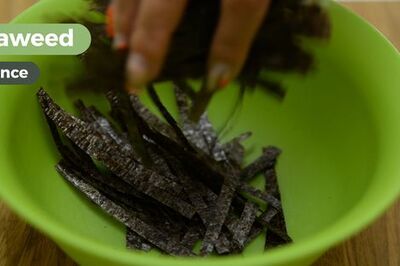
views
What is Darood Sharif?
Darood Sharif is a prayer to send blessings to The Prophet Muhammed. Also known as Salawat in Arabic, Darood Sharif is a way for Muslims to show Allah respect for the prophet. Muslims commonly recite this phrase during their five daily prayers, particularly in the tashahhud portion, as well as whenever the name of the Prophet Muhammad is mentioned. Darood Sharif means “peace be upon him.” Through the blessings of Darood, Muslims hope that Almighty Allah will forgive their sins and elevate their status in this life and the Hereafter.
What are the benefits and significance of Darood Sharif?
Reciting Darood Sharif is said to be a way to receive blessings. Peace, prosperity, and immense favors from Allah are believed to come to those who say Darood Sharif. Sending 10 Darood (blessings) upon Prophet Muhammad and his household is believed to be rewarded by God and the angels with a thousand-fold return. Furthermore, sending 1,000 Darood is said to protect one from the torment of hell.
Reciting Darood Sharif is believed to have profound spiritual benefits. It is said to secure Muhammed’s intercession on the Day of Judgement, serve as compensation for sins, and be the weightiest of all good deeds. Darood is also believed to earn the affection of Allah and His Messenger, purify one's actions, and provide illumination in the grave, on the Bridge of As-Sirāt, and in Paradise.
It can increase the likelihood of your prayers (du'a) being accepted. Sending blessings upon the Prophet is not solely for his benefit, but also for the benefit of the one who sends the blessings. As The Prophet stated, “When any one of you prays, let him begin by praising Allah, then let him send blessings upon the Prophet, then let him ask for whatever he wants.”
It’s said The Prophet will acknowledge and reciprocate your greetings. Islamic scholars explain that the Messenger of Allah hears the Darood Sharif recited before his grave, and he responds to them. This is a comforting teaching for those in the Islamic faith, as it affirms that the Prophet acknowledges and reciprocates the greetings of his followers, both those present at his grave and those far away.
It can bring comfort and relief. Reciting Darood to Prophet Muhammad may provide a break from dwelling on our overwhelming workload and the abundance of hardships in life. This momentary break frees our minds from the burdens of daily stress, allowing us to breathe calmly. By finding comfort and relief, those practicing the Muslim faith are reminded that they can gradually take control of themselves and any difficult situation. The key is to remember Allah and send blessings upon the Prophet.
Incorporating Darood Sharif into Your Life
Recite Darood Sharif in daily prayers. In your everyday prayers, recite the Darood Sharif as a special devotional practice. This invocation, said after praying for Prophet Muhammad, will reflect your belief in Allah and desire to draw closer to the divine.
Say it during mundane routines. Many Muslims recite the Durood Sharif not only during formal prayers, but throughout the day. They do so to seek blessings, protection, and a closer connection to Allah. This practice should become a regular part of your daily routine, as habitual as brushing one's teeth or having breakfast. Reciting the Durood Sharif instills a sense of spiritual nourishment and wellbeing.
Recite Darood Sharif with devotion. The true power of reciting Durood Sharif lies not in the mere saying of the words, but in the sincerity of your heart. It's about fully embracing the blessings you seek, with genuine devotion and love for the Divine.
Common Darood Sharif Prayers to Recite
Grand Shaykh `Abdullah Daghestani's Salawat (100 times daily) اَللَّهُمَّ صَلِّ عَلَى مُحَمَّدٍ وَعَلَى آلِ مُحَمَّدٍ وَسَلِّم or, “O Allah! Send blessings and peace upon Muhammad and the Family of Muhammad.” As-Salat al-Kaamil اَللَّهُمَّ صَلِّ وَسَلِّمْ وَبَارِكْ عَلَى سَيِّدِنَا مُحَمَّدٍ وَعَلَى آلِهِ كَمَا لاَ نِهَايَةَ لِكَمَالِك َوَعَدَدَ كَمَالِه or, “O Allah! Grant salawat on the Prophet without end on the number of perfection with which You dressed him!” Salawat Kamaaliya اَللَّهُمَّ صَلِّ وَسَلِّمْ وَباَرِكْ عَلىَ سَيِّدِناَ مُحَمَّدٍ وَعَلَى آلِهِ عَدَدَ كَمَالِ الله وَكَمَا يَلِيقُ بِكَمَالِهِ or, “O Allah! Bestow Your Blessings, Peace and Grace upon our Master, Muhammad, and upon His Family according to the Perfection of Allah and as befits his perfection!” The Salawat in at-Tahiyyat اَلْسَّلَامُ عَلَيْكَ أَيُّهَا النَّبِيُّ وَرَحْمَةُ اللَّهِ وَبَرَكَاتُهُ or, “O Prophet! Allah's peace, blessings and grace be upon you.” Salawat to Remove Difficulties and Illnesses اَللَّهُمَّ صَلِّ عَلَى سَيِّدِنَا مُحَمَّدٍ وَ عَلَى آلٍ سَيِّدِنَا مُحَمَّدٍ قَدْ ضَاقَتْ حِيلَتِي أَدْرِكْنِي يَا رَسُولَ الله or, “O Allah, raise our Master Muhammad and His Family. (O Allah!) I can't find my way out of this most terrible situation, get me out! Adriknee, reach me, ya Rasul Allah!” Salawaat as-Sa`adah اَللَّهُمَّ صَلِّ عَلَى سَيِّدِنَا مُحَمَّدٍ عَدَدَ مَا فِي عِلْمِ اللهِ صَلاَةً دَائِمَةً بِدَوَامِ مُلْكِ الله or, “O Allah! Exalt and send peace on our Leader and Master Muhammad on the number of what exists in Allah’s Knowledge with ongoing prayers as long as Allah’s Kingdom exists.”




















Comments
0 comment